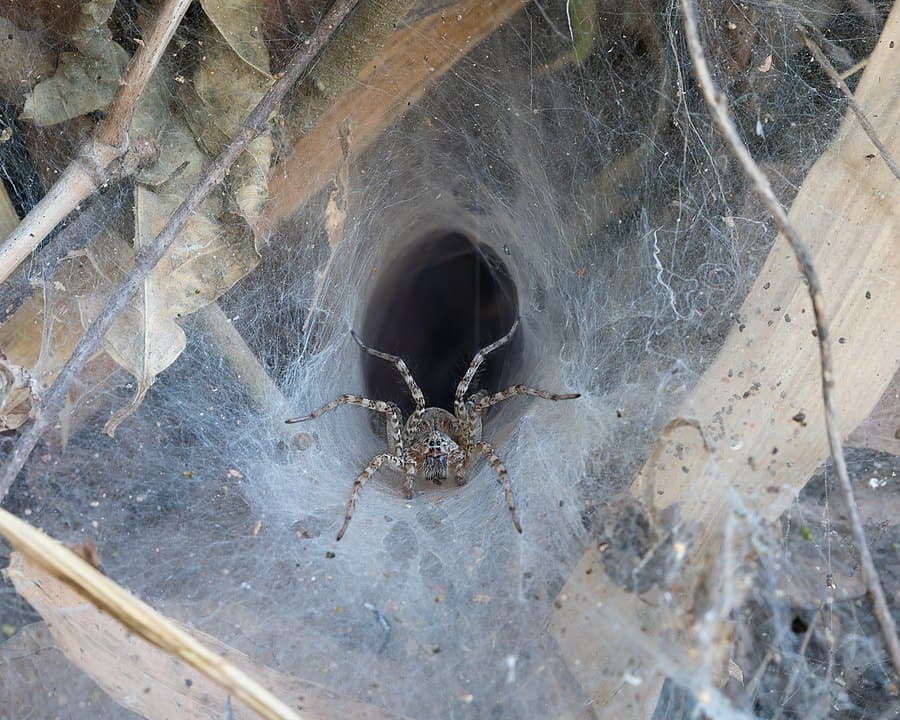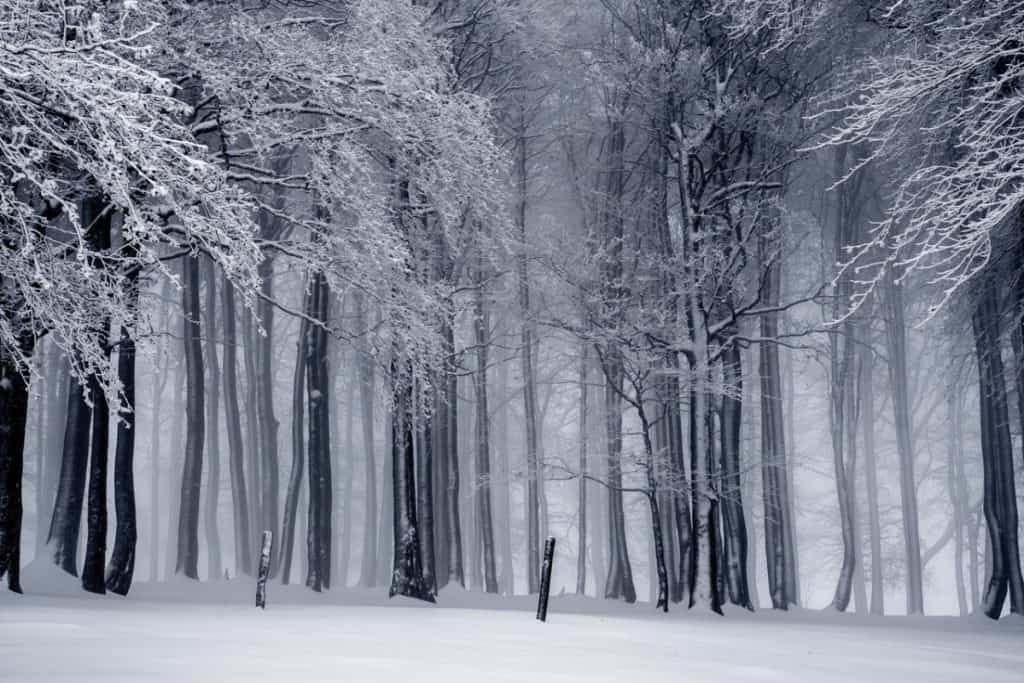
If you enjoy reading this article, why not check out our articles on What Do Spiders Eat? The Complete Guide and Everything You Need to Know About Rose Hair Tarantulas
Do Wolf Spiders Hibernate in the Winter?
Winter seems to affect the lifecycle of spiders. Since they cannot travel long distances in a short period of time, they have to find ways of surviving through this season. There are four main ways in which spiders handle the cold temperatures: hibernating, living for one year and dying in winter, living inside houses throughout the entire year, and producing antifreeze compounds to tolerate the cold temperature. Wolf spiders do not hibernate. It is one of the species of spiders that remain active during the winter season.
How do Wolf Spiders Manage to Survive in Winter?
Wolf spiders have several different solutions to be able to live through the winter months.
- When the temperature starts getting colder, their body automatically starts producing an antifreeze chemical, which will allow them to stay active when the temperature is below the freezing point. They could get a little slower as the temperature gets colder, but they are still fast enough to hunt.
- Another factor that helps wolf spiders survive in winter, is that they live in burrows (instead of spider webs). This helps them remain warm when the weather gets too cold.
- During the winter nights, some of them get out of their burrow and go hunting, in the same way, that they would do on any other night of the year. Others stay inside waiting for an insect to get close to the entrance and attack it. The insects that they eat can be found in this cold season.
- Another way in which wolf spiders survive in winter is that they move through places where there is a lot of debris (fallen leaves, dense vegetation, tall grass, etc.). These places help them stay hidden and attack by surprise. An additional advantage is that the temperature is warmer than on open areas, where the cold wind is stronger.
This insect’s resistance to starvation can be of great help during very cold winter months. Under normal circumstances, pet wolf spiders need to eat an insect about half their size once every day or two, depending on their size. Some wolf spiders have demonstrated that they can survive without eating for over 50 days (that is about half of the winter season). If it is too cold outside to go hunting, the spider can remain inside the burrow several days until the weather becomes less harsh. It is popularly believed that they can do this by adjusting their metabolism.
We have even more information on Wolf Spiders’ seasonal habits in When Is Spider Season?
At what Temperature do Wolf Spiders Die?
Spiders are cold-blooded animals that do not seek warm temperatures. When it gets too cold, they simply become less active, until they become dormant. The antifreeze that the wolf spider produces allows it to stay active and endure temperatures of about -5 C.
Where do Wolf Spiders Go in the Winter?

- Wolf spiders live in their burrows throughout the entire year. Some of them use abandoned holes carved by other animals as burrows and others dig them on the ground. A lot of times they are almost vertical and surprisingly long holes (several times their body length). From the outside, their burrows have silk around the entrance and no lid covering it.
- They start digging their burrows by using their fangs to loosen and remove soil, This is not convenient because their fangs, which they use to eat, can get deteriorated if they dig too much. Next, they use their legs to push their bodies against the walls of the burrow and compress the soil. Finally, they use silk on the walls of their burrows to keep the loose earth from collapsing.
- Wolf spiders do not need a web to trap their prey, Instead, they rely on their excellent vision, legs that sense vibrations, and their great speed and strength to hunt. They are strong, fast, nocturnal, and solitary ground dwellers.
- Some of them travel long distances from their burrows in search of food. They either chase or ambush insects that are moving through the ground. Other wolf spiders wait inside their burrows to hunt approaching prey.
When they attack, they jump onto their prey, hold them with their legs, and bite them. Through this bite, they inject their venom through their fangs, which paralyzes them and liquefies their interior.
Finally, they eat liquified prey. The spiders that travel to hunt, eat the prey in the place where they caught it. The ones that stay in their burrows, carry the liquifying prey inside to be eaten.
The Arctic Wolf Spider
The wolf spider is so resistant to cold weather that it lives almost everywhere in the world, except for Antarctica. One of its species, the Arctic wolf spider, lives in the coldest regions of the North Pole, in places like Greenland. Actually it is believed that this spider can help diminish global warming because its diet indirectly affects the amount of CO2 released in the atmosphere.
Do Wolf Spiders Come Inside Houses in the Winter?

The majority of the species of spiders that live inside a house stay indoors throughout their entire lives; and the species that live outdoors, stay outside always. This is due to the fact that finding food and water inside a house is very different than finding them in the wild. Only very few species of spiders can live in both types of places.
Wolf spiders always live in the wild. If a wolf spider happens to have a burrow near a house, it could get inside occasionally to hunt for food. That does not mean that they will stay there during the entire winter season. Some wolf spiders tend to go hunting to the same locations continuously, while others go to different places.
If you see a wolf spider in your house, remember that it will not attack a person unless it is provoked. Wolf spiders also jump, but they usually do not jump on humans. If someone runs into a wolf spider surprisingly, it could feel threatened and attack (even if it was an accident). When they bite, their fangs inject a poison that is not lethal to humans.
However, the bite does hurt as much as a sting from a bee or wasp. It produces swelling and a reddish color, but there are no serious medical consequences (unless the person being bitten is allergic to the venom). While some people that find them in their house like to capture them and keep them as pets, others prefer to kill them, just to play it safe.
If you want to keep them away from your house, remove all the debris from the garden (including piles of rocks and wood) and mow the tall grass. Also, cover all cracks and holes in walls, ground, floors, doors, and windows. It can help to put screens on vents and any places near the foundation where these spiders could crawl. Some people might even recommend turning off the outdoor lights because they attract animals that wolf spiders like to eat. If this fails you can call pest control experts to handle the problem.
If you’re still worried about having spiders in the house, take a look at our article How to Get Rid of Spiders Naturally.
How does the Lifecycle of the Wolf Spider Relate to Winter Season?
Wolf spiders lay their eggs in spring (probably because eggs could freeze in winter). The spiderlings have the opportunity to grow during the year and they survive their first winter as young spiders. By the time the winter is gone, they are adults and ready to mate. The female lays several dozens of eggs, which she carries on her abdomen (in a silk bag that she weaves). The eggs will hatch in two or three weeks and the spiderlings stay the female’s abdomen for several days. Male wolf spiders live for about a year and females can live for several years.
Conclusion
Wolf spiders are a very interesting species of spiders. Their ability to hunt prey makes them a very interesting species. Their way they obtain food seems to fit perfectly well with their need to survive during winter. Maybe they decided to hunt using the debris as camouflage and to live in burrows because it was the easiest way to obtain food in summer, and later it became a solution to stay warmer in the winter. Maybe during the winter months they made these decisions. Maybe they slowly started modifying their behavior until they found this unique way of life that is efficient in any season of the year.
Wolf spiders have many ways of adapting to the cold weather and they can choose which every they find more convenient. They can choose to stay in their burrows during the coldest days of the winter season, if they want to. Their resistance to starvation gives them enough time to survive. Their antifreeze compounds allow them to survive at lower temperatures than the freezing point.
Wolf spiders are considered as good pets. There are places where you can buy them. You need a ventilated cage, with dirt, similar vegetation to that of its habitat and a hiding place for it. It needs a plate with fresh water and you can either buy or trap the insects it will be eating. During the winter months, it will remain active, which makes it an interesting pet to have.
If you enjoyed reading this article, why not check out our articles on Can Spider Fangs Grow Back? Let’s Find Out and How Much Does Owning a Tarantula Cost?
Recent Posts
Tiny Black Bugs in Bathroom NO WINGS: What They Are and What to Do!
Finding tiny black bugs in your bathroom can be uncomfortable, to say the least. Especially if they are persistent, or they appear in very large numbers, which they often like to do. When it...
Tiny Black Bugs in Plant Soil - What Are They & What To Do About It
A short horror story: You get a new houseplant. You do your best to take care of it. You’ve ensured that it has the right soil, the right amount of sun, it gets enough water. And then one day, you...

